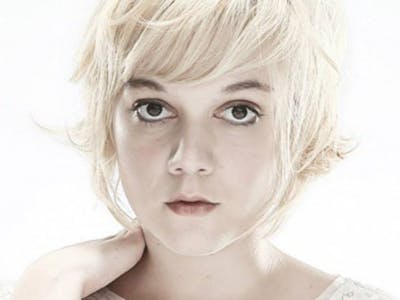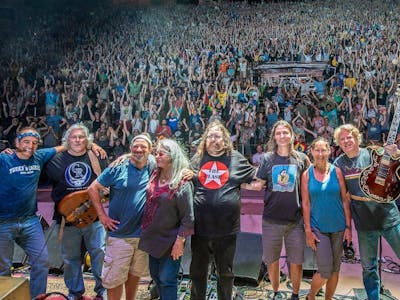2015 marks the 50th anniversary of the Grateful Dead’s formation. Few bands have cut such a wide path (musical and otherwise) across the American cultural landscape. In July, the “core four” members (Bob Weir, Phil Lesh, Bill Kreutzmann, and Mickey Hart) will reunite for a trio of final shows at Chicago’s Soldier Field, site of the final Grateful Dead shows before Jerry Garcia’s death. The quartet will be joined by Trey Anastasio of Phish on guitar and vocals, frequent Dead collaborator Bruce Hornsby on piano, and RatDog member Jeff Chimenti on keyboards.
While the surviving bandmembers fire up the reunion engine, another group of musicians continues to go quietly about their business carrying on the Dead’s legacy, filling mid-sized venues night after night. Dark Star Orchestra formed in Illinois 18 years ago, and in that time has managed to play more shows (2,400 and counting) than the band to whom they pay tribute. Most nights feature a faithful recreation of an original Grateful Dead show (right down to arrangements and the combination of musicians onstage), although some are original setlists chosen by the band. The band brings their 2015 Winter Tour to the Madison Theater on Saturday night for a Valentine’s Day extravaganza. Drummer Dino English was kind enough to answer a few questions for me via email this week.
Nat Tracey-Miller: What’s your favorite era of Dead shows to recreate?
Dino English: I think I love it all about the same until it gets to ‘92 - ‘95, which we don’t do often. I’m not a huge fan of some of the songs they wrote at the end, although I do enjoy Lazy River Road and Corrina. We never dog a show though just because it was a bad show they played. We always play our best and some of those early 90’s shows, dare I say, can actually turn out better than the original because some of those GD shows were not so well played.
NTM: Are some periods more difficult? Less interesting?
DE: I think I maintain interest in all the periods or eras. The late 60’s takes the biggest jump in styles from the others, I think, in that they were so young then (in their early 20’s) and they were playing with youthful exuberance and reckless abandon which is why some fans like it so much. Later they became more refined and that’s good too. One drummer shows (‘71-‘74) are obviously a stylistic switch as well since I’m not working with Rob, the other drummer. The workload is all on me to keep things together, but those shows can be very rewarding as well.
NTM: The Dead’s sound changed a lot over the years—Jerry’s guitar tone, the keyboard tones, even the sound of the drums as those kits grew in the 80’s. Do you use different equipment to match those details from night to night?
DE: Yes, that’s what we do. Basically everything we have is similar to or the same as what the GD used down to our soundboard and monitors. Our stage is a bit of a history museum.
Jeff Mattson (lead guitar, vocals) plays a custom built guitars that are wired like Jerry’s as well as Travis Bean, the kind Jerry played in ‘76. He plays through a Macintosh power amp with a preamp designed by Brad Sarno to be similar to the Fender Twin Jerry played through. He also uses JBL speakers just as Jerry used. Rob Eaton (rhythm guitar, vocals) plays guitars and amps similar to what Bob Weir played. Modulus, Ibanez, and Gibson 335 guitars. Skip (bassist) plays Alembic, Modulus, and a customized Guild hollow body as Phil used. Rob Barraco (keyboards, vocals) plays Kurzweil keys, Hammond B-3 Organ, a Yamaha GS1, and a Fender Rhodes. The Rhodes belonged to Brent Mydland and the others are similar to what he and the other keyboardist for the GD played.
Along with the drum kit size changes we make from night to night, we have similar electronic midi equipment the drummers used and “The Beast” which is all the drums they had behind the that they used for the drum as well as a custom built "Beam" that is similar to the what Mickey uses. Many of cymbals we use are actual cymbals the GD used, mostly Zildjian and some Sabian.
NTM: How much time do you spend listening to a specific show before you perform it? Does the whole band give a listen-through together?
DE: No one is required to listen to the show, but everyone is expected to know the arrangements of the show. Sometimes many of the band will listen to the show together in the front lounge of the bus during the day. Many times, that’s when Rob (Koritz) and I are setting up our drum kits, so we listen later. Mostly, we jump around to key into the spots where the arrangements may differ often. For instance, we may check to see if a song is played half time or double time, whether another song had a certain intro or whether they stuck a jam in a section or not etc. More or less we follow the arrangement but within these arrangements are plenty of room for spontaneity, interpretation, and improvisation which are all key elements as well, perhaps the most important elements.
NTM: How does the lineup for the Dark Star Jubilee come together? Are you pretty hands-on with your destination events?
DE: Tim Walther, our manager, is also a promoter and the organizer of the All Good Festival [currently staged east of Columbus, OH], so he has vast experience putting together festivals. Basically, we make suggestion on who we would like to include, which normally turns out to be a large list. He then tries to make it work within his regular framework by checking on availability, booking the bands, and making the schedule.
NTM: Do any DSO members have plans to attend the Fare Thee Well reunion shows in Chicago?
DE: Hopefully. That part of our schedule is still in flux, so we will see what comes together.
NTM: What are your thoughts on the band lineup they chose?
DE: I think it’s a great lineup! I’m excited about it. I think the key to any good Grateful Dead style music is a balance in power. When you have one or two guys calling all the shots then you have that person’s interpretation of how things should be rather than the GROUP MIND, which is what the Grateful Dead were. When one or two people are in a position to fire any of the others, then you run into problems, and the music suffers. Jerry was more or less the leader in the Grateful Dead, but he was also the glue that held together the vastly different approaches of the other band members. I think the balance of power is looking pretty good for these shows so I think the music will turn out pretty good. Of course the best way to go in is to have lower expectations and be happily surprised with what you get. They aren’t spring roosters anymore, after all. But I think the potential for good music is there.
NTM: Every living member of the Dead has sat in with DSO at one time or another. Is it intimidating to have Bob Weir plug in next to you, or does it feel pretty natural?
DE: First off, Mickey has yet to sit in with us however he has had some of us sit in with his band so more or less that’s true. It’s mostly fun but there can be a hyper sense of awareness to the guy we regard as a hero on stage with us which throws of that balance of power that we have in DSO as a band. But the thing is, most of the time these guys are coming in to sit in with us so they know they aren't in charge any more than they were with the Grateful Dead. They can tell we are a self-contained band that operates under the principle of the group mind, so as long as we can keep that spirit, the music flows. It can be a challenge to maintain that group approach with one of your hero’s on stage but when we let go and let the music play itself and just do our regular thing, the magic can happen with the guest sit in and it has. One time I think it worked real well was when Phil sat in with us at the Fillmore in San Francisco. We all seemed to listen real well to each other, especially the rhythm section.
Dark Star Orchestra
Madison Theater, 730 Madison Ave., Covington
Saturday, 9 PM (Doors 8 PM)
$23 advance, $25 day of show



